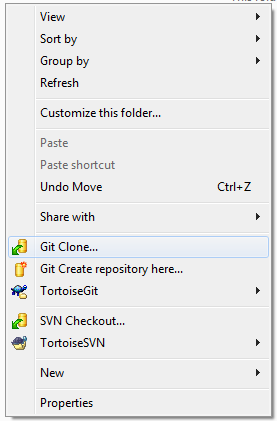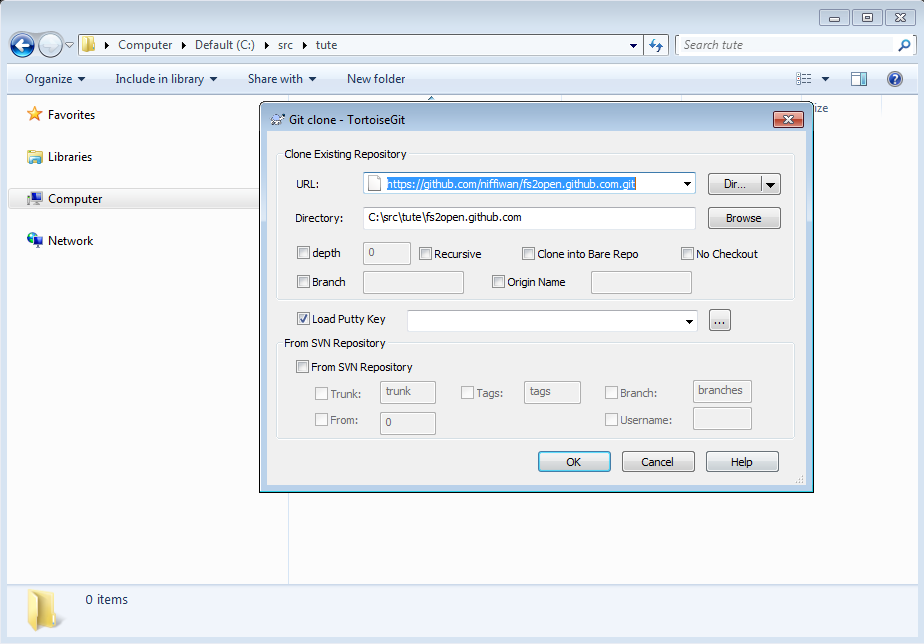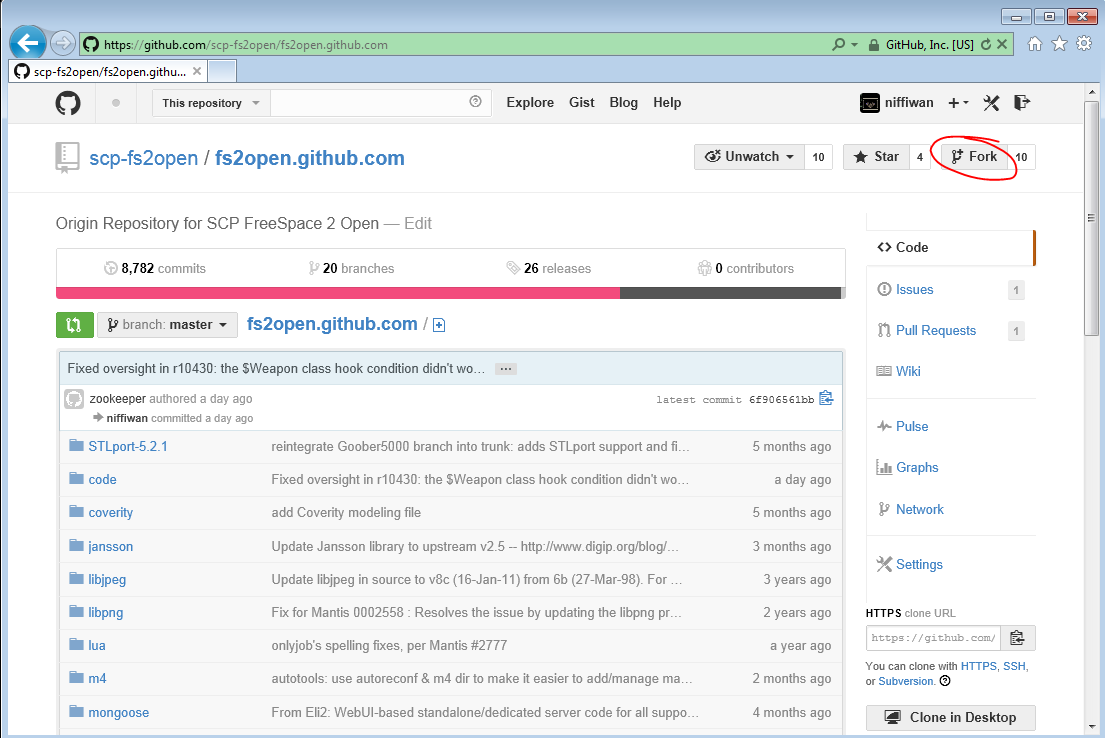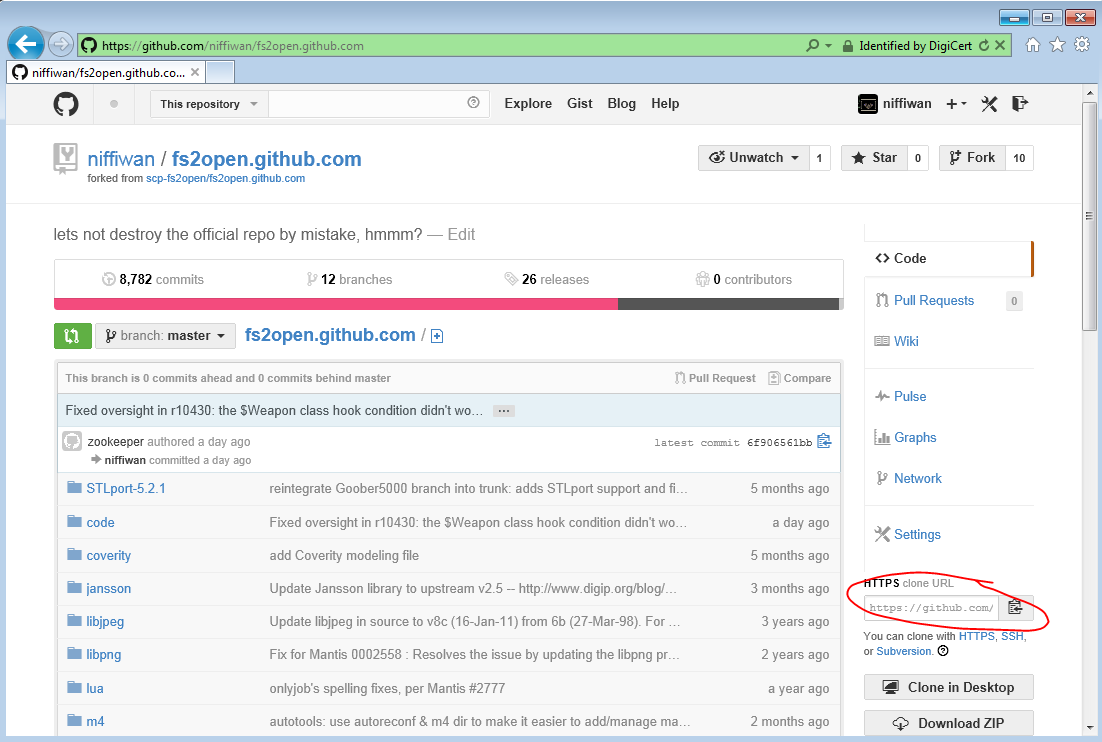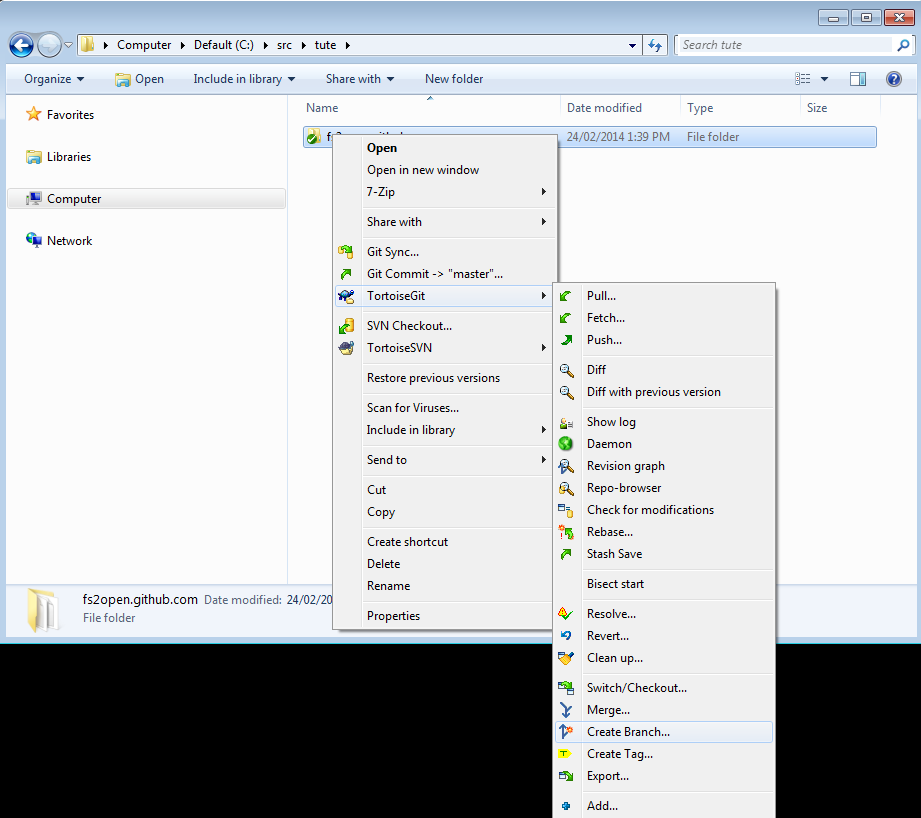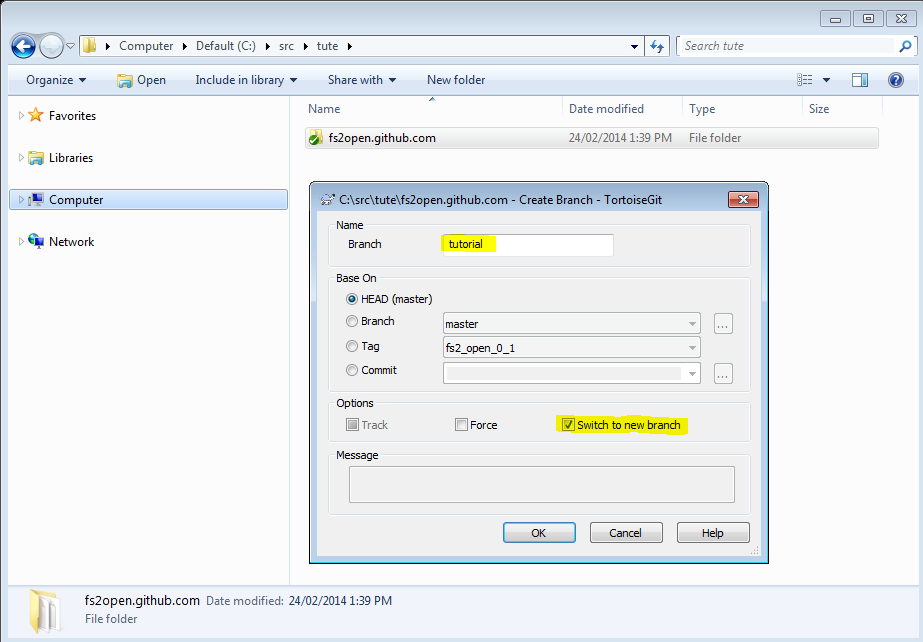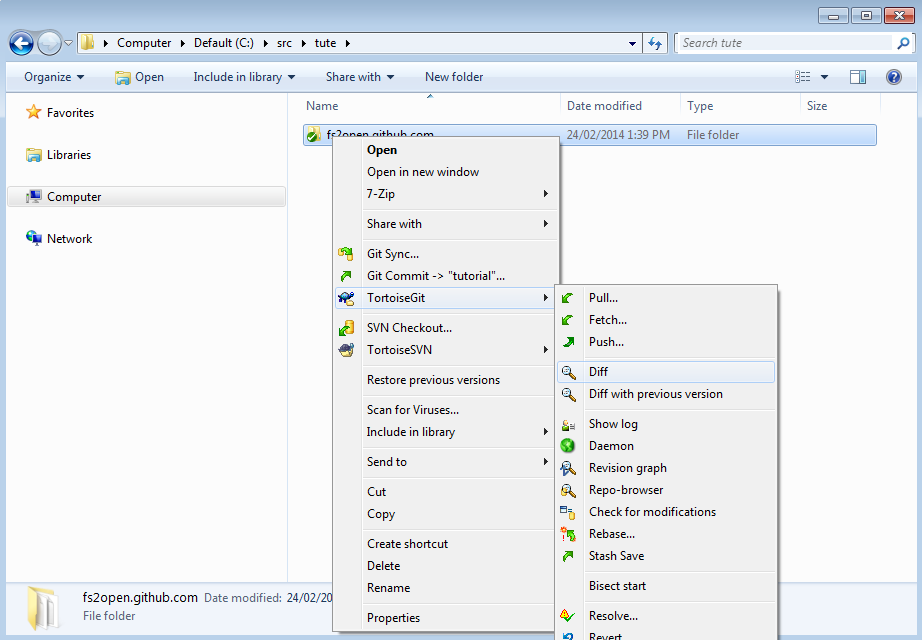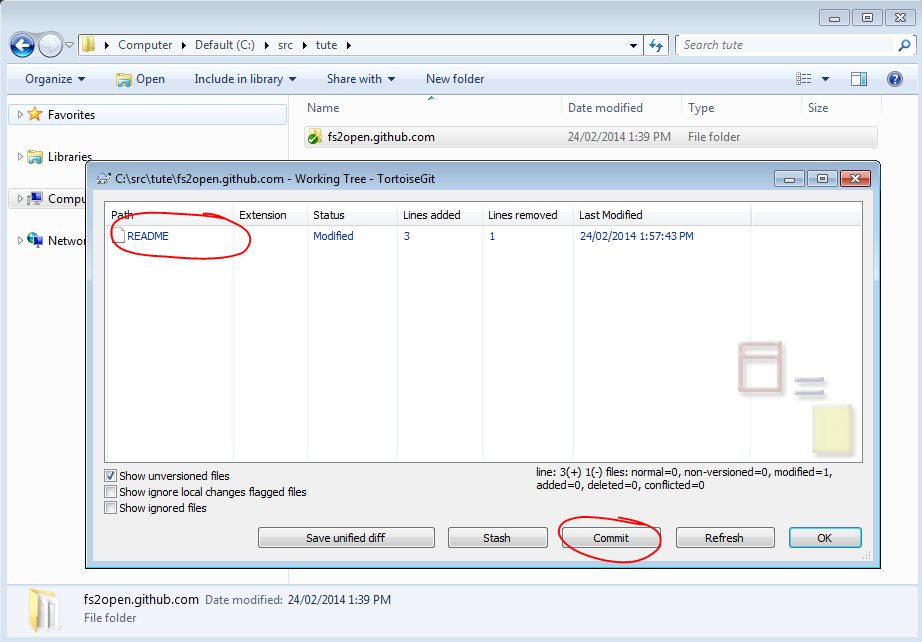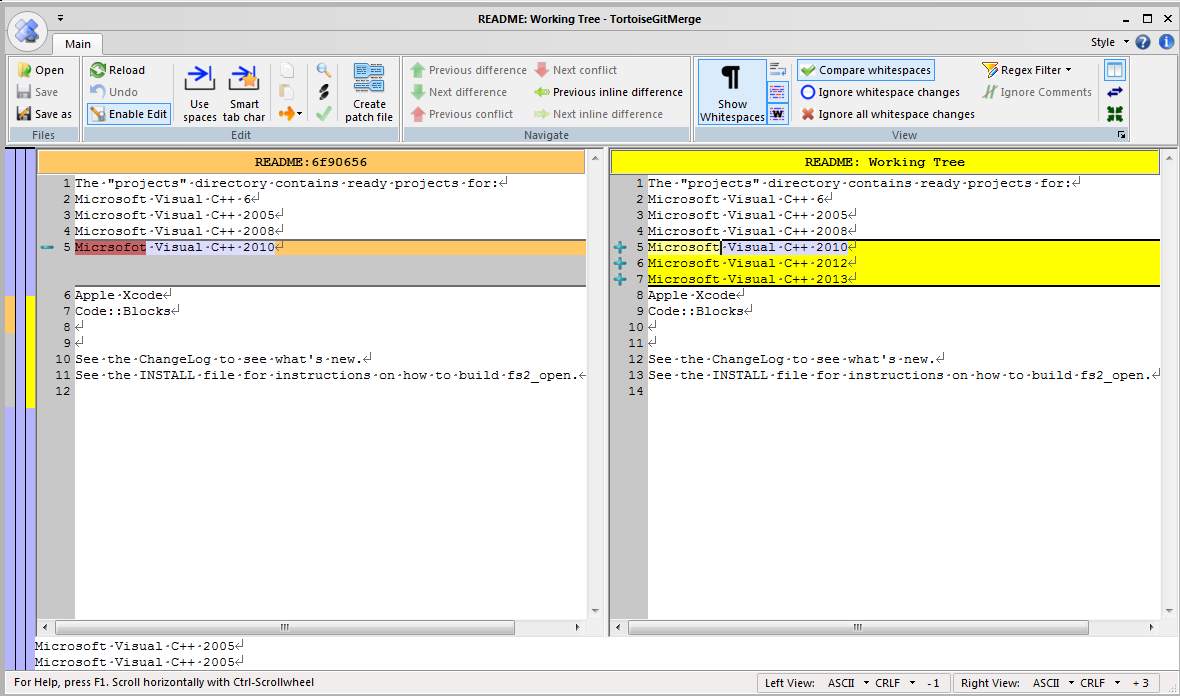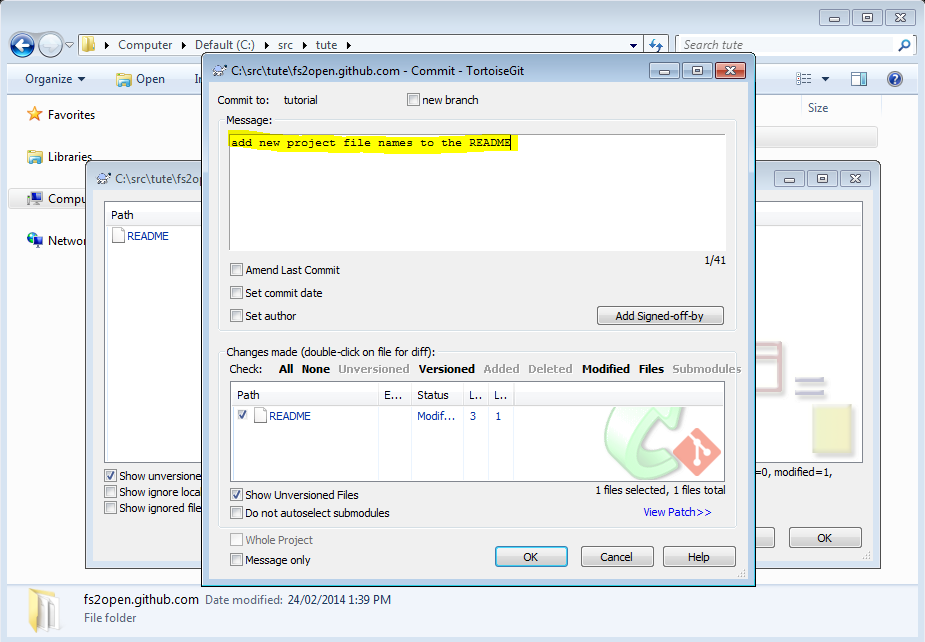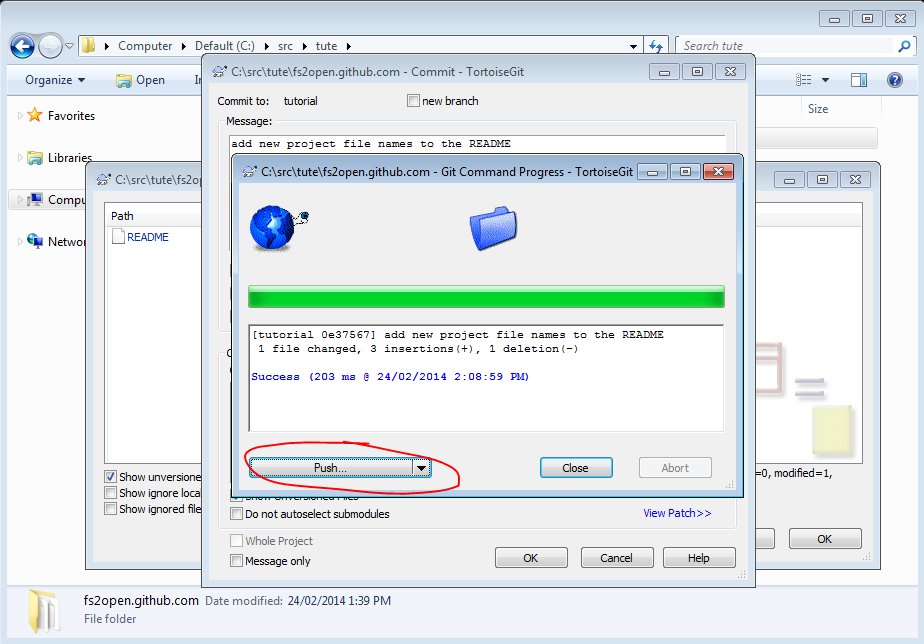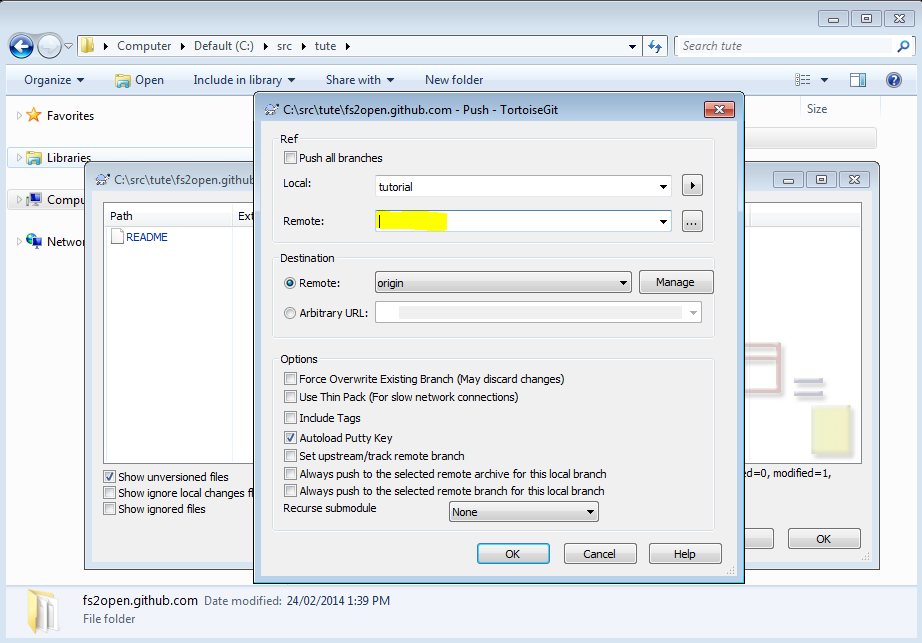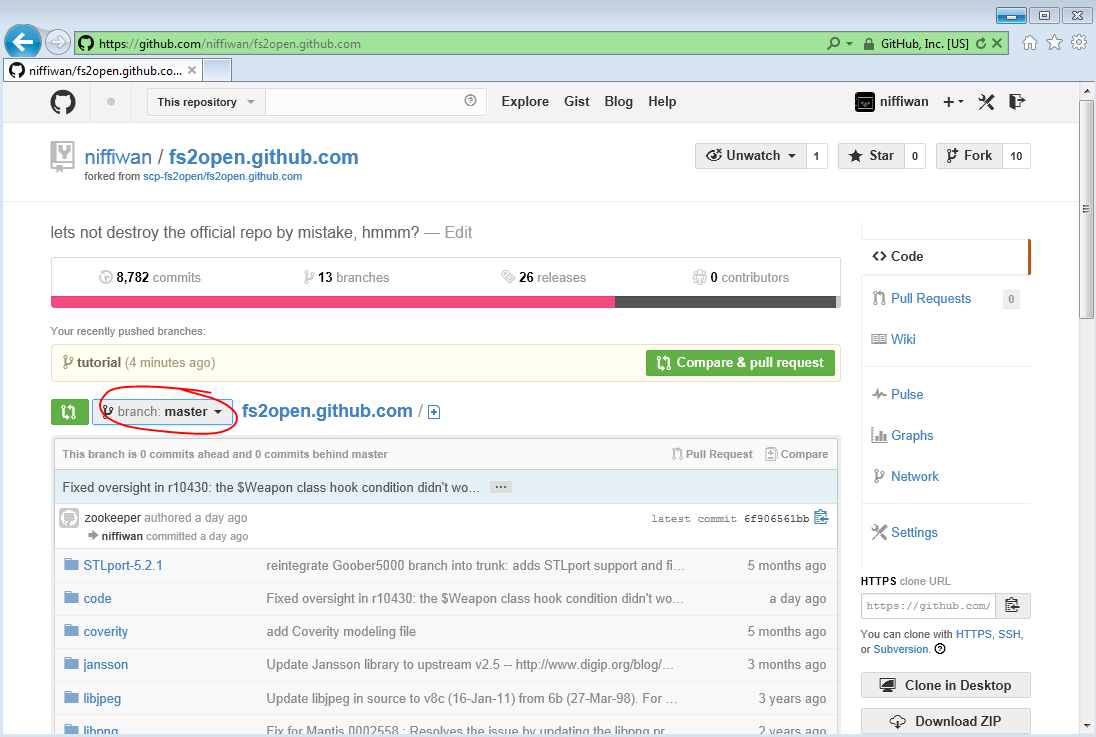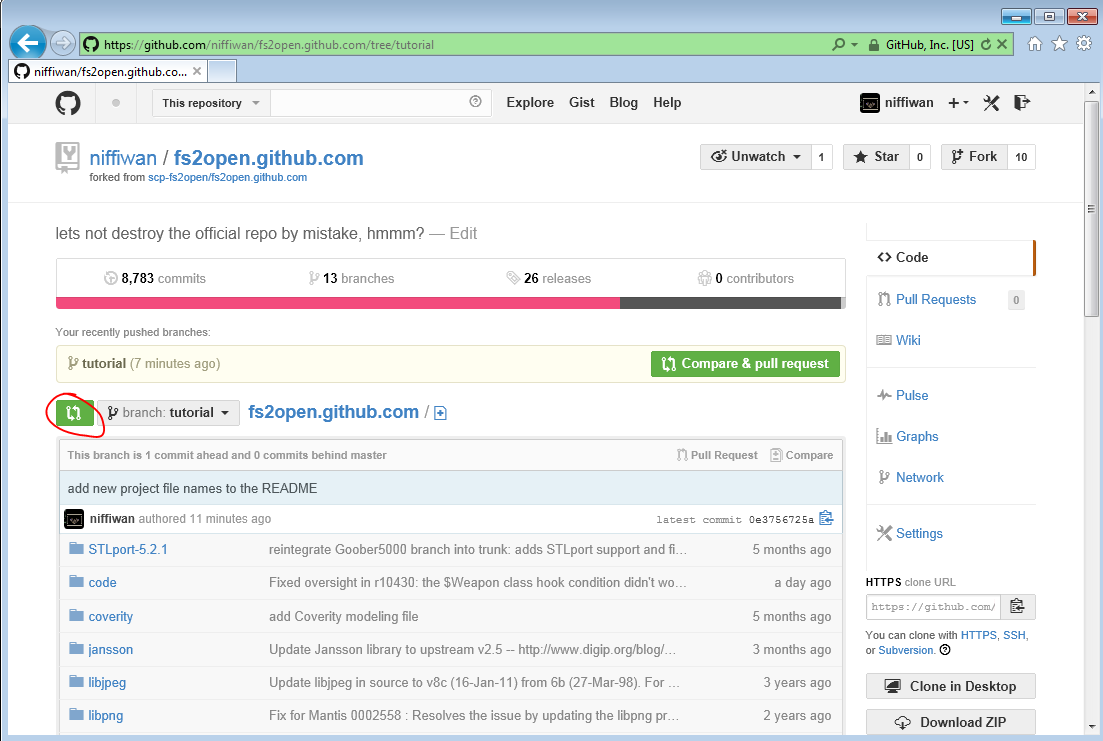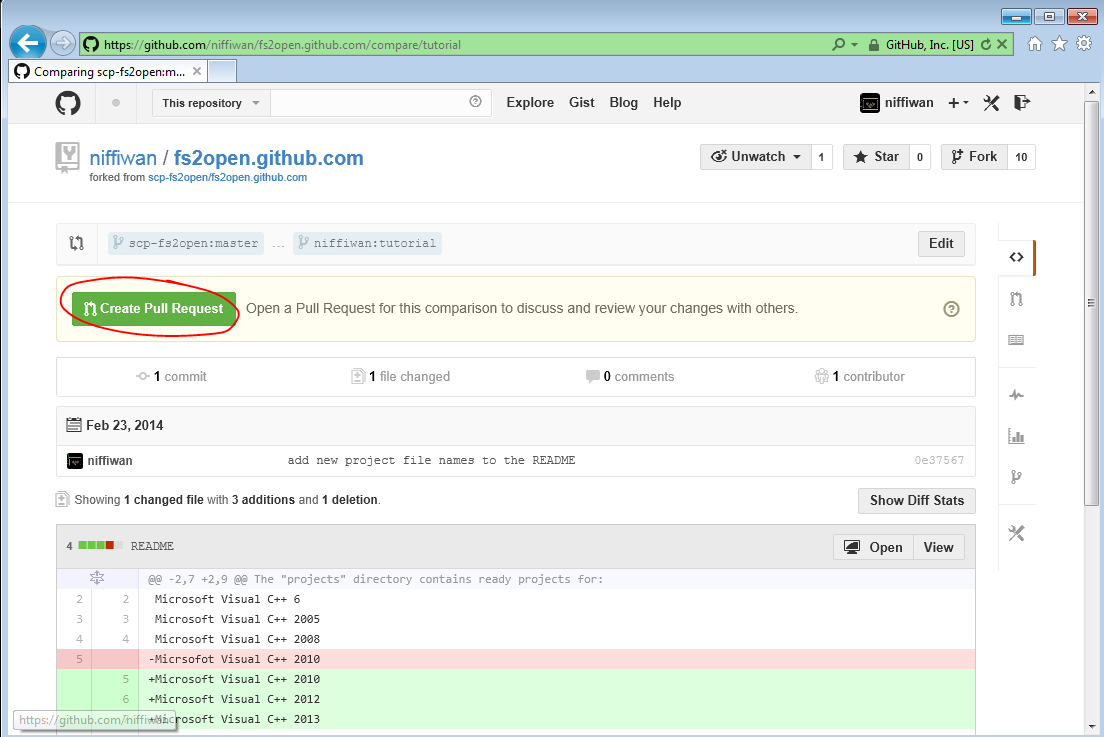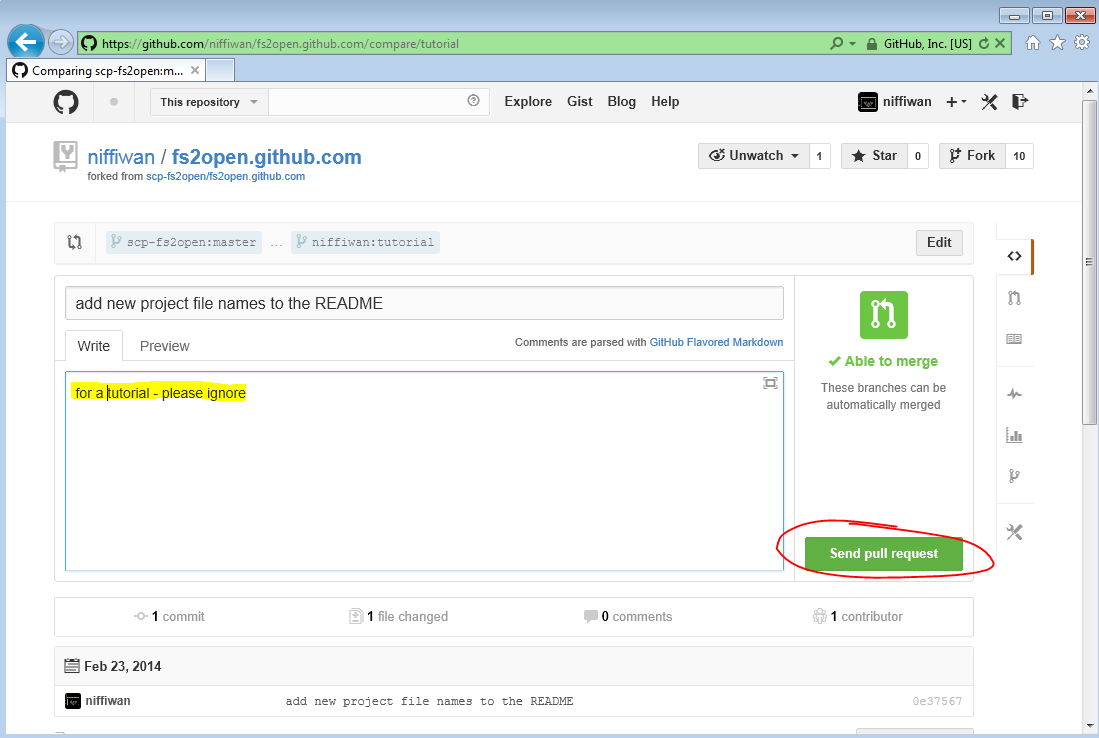Difference between revisions of "Guide to FS Open and git"
From FreeSpace Wiki
(TOC I summon thee!) |
(→Collaboration with remotes: Tortoise Git: stage 1) |
||
| Line 62: | Line 62: | ||
== Collaboration with remotes: Tortoise Git == | == Collaboration with remotes: Tortoise Git == | ||
| + | |||
| + | Here we'll go through: | ||
| + | |||
| + | * adding a remote branch from someone else's repository | ||
| + | * committing to that branch and pushing it back to your own repository | ||
| + | |||
| + | You may do this when you're collaborating with another developer on a feature prior to it being committed to the master | ||
| + | |||
| + | * Start by right clicking on the local repository directory and selecting "Settings" | ||
| + | (piccy) | ||
| + | * Select the "Remote" item from the left hand menu, then | ||
| + | ** add a local name for the new remote repository | ||
| + | ** add the remote repository URL (I'm using m!m's github repository in this example) | ||
| + | ** Set the "Tags" dropdown to "None" | ||
| + | ** Click "Add New/Save" | ||
| + | (piccy) | ||
| + | * You should be prompted if you want to "...fetch remote branches...", select "Yes" | ||
| + | (piccy) | ||
| + | * All the defaults should be fine, click "OK" | ||
| + | (piccy) | ||
| + | * This step may take a little time. | ||
| + | * When it's complete you want to create a local branch to track one of the remote repositories branches | ||
| + | * Right click on the local repository directory and select "Create Branch..." | ||
| + | (piccy) | ||
| + | * Set "Base On" -> "Branch" to the remote branch you want to work on | ||
| + | * Check "Switch to new branch" | ||
| + | * Click "OK" | ||
| + | (piccy) | ||
| + | * Write some code! | ||
| + | * When you're ready to commit, right click on the local repository directory and select "Git Commit -> (branchname)..." | ||
| + | (piccy) | ||
| + | * Enter a commit message | ||
| + | * Review the changes that will make up the commit by double-clicking on files in the list | ||
| + | (piccy) | ||
| + | * When the commit it completed there will be a button to "Push" your branch. | ||
| + | * You probably won't have permission to push to the other persons remote branch, so push to your own remote repository | ||
| + | * You may want to change the remote branch name (e.g. with a reference to the remote it can from) | ||
| + | * Select "Origin" as your "Destination" -> "Remote" | ||
| + | * Click "OK" | ||
| + | (piccy) | ||
| + | * Now you can tell the other person that you've added to their branch and have pushed the changes to your own remote branch | ||
| + | * They can now follow (most of) the steps above to add your repository as (to them) a remote and fetch/merge your changes into their branch | ||
| + | * When that happens you probably want to get their changes into your local branch | ||
Revision as of 07:51, 25 February 2014
Contents
Getting the source: Tortoise Git
(based on Getting_the_FreeSpace2:_SCP_Source_Code)
- Download and install Git For Windows (this is a dependency for TortoiseGit)
- Download and install TortoiseGit (you probably need to reboot after installing)
- Make a new folder on your HDD where you'd like to install the code. You'll need a fair bit of space for the code + the intermediate files when building it. Press right mouse and choose Git Clone from the list.
- A new window will open up. Cut and paste the URL of the FSO Github repository into the URL of repository box (https://github.com/scp-fs2open/fs2open.github.com.git)
- Press OK to begin downloading from the repository (this may take a few minutes, depending on the speed of your internet connection)
Simple Development: Tortoise Git
Note: the guide assumes that you will be developing using a github fork (which is recommended for everyone, SCP members and non-members alike)
- Go to the github webpage and create an account
- Go to the FSO repository on github and click on Fork
- Record the URL for your newly forked copy of the FSO repository
- Get the code per the guide above (fix with proper intra-page link)
- Note: you need to use the URL for your forked repository, not the main FSO repository listed above
- Right click on the repository directory and select TortoiseGit -> Create Branch
- Note: all development should be done in a new branch, instead of being done in the "master" branch. It's just simpler
- In the new window, enter the name for the new branch, verify that the branch is based on HEAD (master) and check the "Switch to new branch" box
- Write some code with your Editor of Choice
- Test your new code
- When you're happy with the code, right click on the repository directory and select TortoiseGit -> Diff
- Review your changes by double-clicking on all the files listed in the new window (ensure no unwanted changes have snuck in!).
- This is how the diff will be displayed (using TortoiseGitMerge, which is also used to resolve conflicts)
- When your review is complete, press "Commit" (in the same window that you double clicked on all the changed files)
- In the new window, add a commit message and press OK
- When the commit is complete, press the "push" button to send your commit(s) to your github repository
- Select your local branch name from the drop down list and ensure your Destination -> Remote: is "origin"
- If you want to, you can give the public remote branch a different name to your local branch (this can be useful when rebasing a branch already published to your public repository)
- Finally, press OK
- Go to your Github Repository webpage and select the branch you just pushed
- When you have the correct branch selected, click on the "Pull/Review/Compare" button
- Now click on "Create Pull Request"
- Note: the previous three steps can be done as a single step if you have recently pushed a branch by selecting the "Compare and Pull Request" button
- Add comments to the pull request if you wish, then click "Send Pull Request"
- And that's it! Now you wait for the pull request to be reviewed and committed to primary FSO master branch
Syncing and Simple Conflict Resolution: Tortoise Git
TBA
Collaboration with remotes: Tortoise Git
Here we'll go through:
- adding a remote branch from someone else's repository
- committing to that branch and pushing it back to your own repository
You may do this when you're collaborating with another developer on a feature prior to it being committed to the master
- Start by right clicking on the local repository directory and selecting "Settings"
(piccy)
- Select the "Remote" item from the left hand menu, then
- add a local name for the new remote repository
- add the remote repository URL (I'm using m!m's github repository in this example)
- Set the "Tags" dropdown to "None"
- Click "Add New/Save"
(piccy)
- You should be prompted if you want to "...fetch remote branches...", select "Yes"
(piccy)
- All the defaults should be fine, click "OK"
(piccy)
- This step may take a little time.
- When it's complete you want to create a local branch to track one of the remote repositories branches
- Right click on the local repository directory and select "Create Branch..."
(piccy)
- Set "Base On" -> "Branch" to the remote branch you want to work on
- Check "Switch to new branch"
- Click "OK"
(piccy)
- Write some code!
- When you're ready to commit, right click on the local repository directory and select "Git Commit -> (branchname)..."
(piccy)
- Enter a commit message
- Review the changes that will make up the commit by double-clicking on files in the list
(piccy)
- When the commit it completed there will be a button to "Push" your branch.
- You probably won't have permission to push to the other persons remote branch, so push to your own remote repository
- You may want to change the remote branch name (e.g. with a reference to the remote it can from)
- Select "Origin" as your "Destination" -> "Remote"
- Click "OK"
(piccy)
- Now you can tell the other person that you've added to their branch and have pushed the changes to your own remote branch
- They can now follow (most of) the steps above to add your repository as (to them) a remote and fetch/merge your changes into their branch
- When that happens you probably want to get their changes into your local branch
